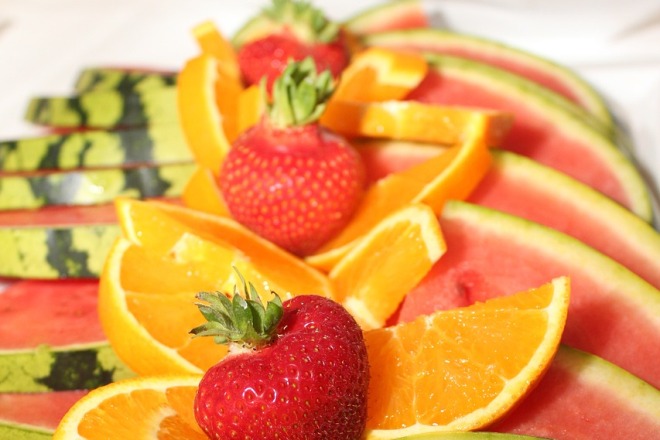
Photo Credit: by HNBS, Pixabay.com
You probably know that what you eat affects your skin, but did you know that your diet might actually be able to provide some added sun protection factor? Yes, that’s right: just like sunscreen, your food can provide SPF!
As you’ll see, some of the best SPF-boosting foods are the most readily available during the summertime, when the sun is strongest and we need it most (and when we are most likely to get lots of sun exposure due to all the nice weather and outdoor activities). That’s why eating fresh, in-season produce is always a good idea for your health.
In this article, we’ll take a look at how food and drink can affect your skin’s natural sun protection capabilities. Read on to learn more about what foods to eat (and avoid) if you want to boost your skin’s natural SPF.
How does your diet provide SPF?
So how, exactly, does it work? How can your diet function as sunscreen for your skin? Can you throw away your Ombrelle sunscreen if you make the right dietary changes?
As Sunday Riley puts it, “The link between diet and our skin’s ability to defend itself from the sun comes down to oxidation. Essentially, excessive ultraviolet radiation damages the skin cells via a process called oxidative stress. Arguably, certain nutrients can increase the body’s defense from oxidative stress.” Oxidative stress occurs from the break down of metabolic processes going on in the body and can render the skin less likely to protect itself.
In other words, boosting your consumption of antioxidant-rich foods can help your body fight off free radicals, which can reduce the oxidative stress on your body. This not only protects your skin against burning from the sun, but also aging.
In addition to antioxidants, Omega 3 is another helpful nutrient that can protect against sun damage by reducing the inflammation caused by ultraviolet radiation. A diet with plenty of Omega-3 fatty acids is good for your skin, brain, and heart health.
As you can see, what you eat can be a powerful way to protect your skin from damage from the sun! You may have heard of supplements claiming to work as edible sunscreen, but this is a bit misleading, because even if you consume a diet with a high sun protection factor, you still need to slather on the sunscreen when going outdoors.
Sunday Riley puts it this way: “Problems come about when people stop using sunscreen and instead rely on a diet solely to protect their skin. … Considering 1 in 5 Americans will develop skin cancer by the age of 70 and more than two people die of skin cancer in the U.S. every hour, this is a serious issue, especially when you take into account that five or more sunburns double your risk of skin cancer.”
Yes, your diet can provide SPF, but you want to eat SPF-boosting foods in addition to wearing sunscreen, not instead of wearing sunscreen.
What to eat and drink for SPF
Now you know that what you eat can provide a layer of protection from the sun. Of course, you don’t want to throw away your sunscreen even if you consume a diet rich in SPF-boosting foods. Still, it can be another powerful tool in your toolbox to help protect your skin from the sun’s burning and aging abilities; what you eat can provide nutrients that ward off damage, help our skin become resilient, and help us recover faster if a burn does occur.
So what exactly are the foods that can boost (or hinder) your skin’s natural SPF?
Some of the most antioxidant-rich foods include sweet potato, liver, red fruits and veggies (like carrots and red bell peppers), citrus, almonds, sunflower seeds, avocado, leafy green vegetables, and egg yolks. Omega-3 rich foods include oily fish like salmon, sardines, and mackerel, but some people take Omega-3 supplements if they don’t care for seafood. Other foods like seaweed, chia seeds, flax seeds, kidney beans, and edamame are also high in Omega-3 fatty acids.
The good news is that many of these foods will improve overall health, not just skin health!
Everyday Health also points out the power of tomatoes: “Foods rich in lycopene, a plant-based pigment with antioxidant properties, can reduce the severity of sunburn and increase the moisture and elasticity of skin. … Eating a variety of lycopene-rich foods, including whole tomatoes, juices, and sauces, is one way to optimize your sun protection from this food. … enjoying tomatoes cooked in olive oil may increase the absorption of lycopene.”
The Academy of Culinary Nutrition also recommends consuming hemp seeds in smoothies or spreads. “Hemp seeds, as well as chia seeds and flax seeds, are a rich source of omega 3 fatty acids, which help our skin maintain its integrity, keeping it smooth, strong and supple. Omega 3s are also highly anti-inflammatory, so these foods can help with healing if a sunburn occurs.”
Another major source of lycopene just makes sense in the summer: watermelon! No wonder it’s a staple food at sun-soaked pool days and BBQs. As Healthline reports, “After a few weeks of daily, juicy watermelon consumption … lycopene can eventually act as a natural sunblock. Researchers note, though, that it doesn’t necessarily take the place of other protective measures, like SPF and sun-protective clothing, against sunspots and skin damage. But when it comes to anti-aging, this extra boost sure won’t hurt.”
Grapes, coffee, green tea, berries, cocoa (dark chocolate, anyone?), and herbs like oregano can also provide some added SPF.
You won’t have a hard time finding most of these foods at your local grocery store or supermarket in the summer. It just makes sense that foods that offer the most sun protection tend to be in season and widely available during the summertime. Thanks, Mother Nature!
###